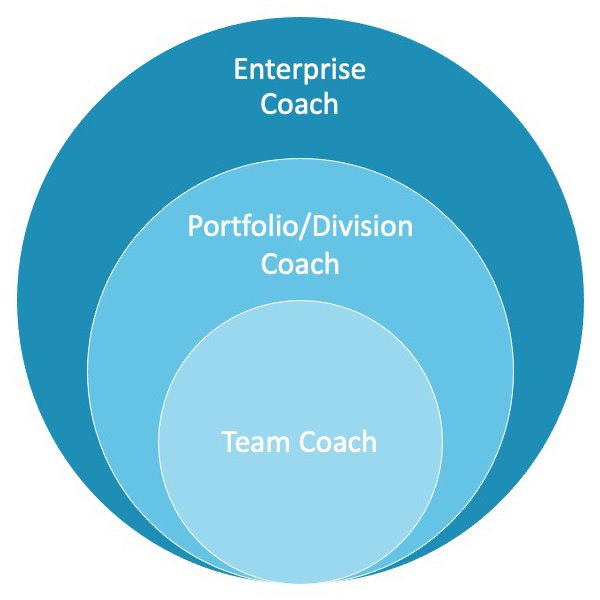When you think of the term “Agile Coach” your first thought might be someone who coaches an Agile product team. That’s certainly something an Agile Coach might do, but did you know there are actually many different types of Agile Coaches? With the slow adoption of certification to verify competency, anyone can call themselves an “Agile Coach” without necessarily having the full qualifications.

Types of Agile Coaches
It’s important to pick the right kind of coaching support to fit your objectives. Are you simply looking to help a single team on their continuous improvement journey? Then a Team Coach is what you’re looking for. Are you perhaps looking for support to stand up multiple teams that roll up to a product portfolio instead? In that case, a Portfolio Coach is best suited to the need. Or are you looking to broaden your adoption of Agile practices through an enterprise-wide Agile transformation, seeking to reap the full benefits of Agility for your organization? This is where Enterprise Coaching will be essential for success.
Team Coach
The Team Coach is the most common type of coach. Team coaches focus on a team or a few teams to optimize their work and effectiveness. Team Coaches are a great fit for organizations that are looking to help their teams adapt to the market and be more competitive. These coaches are focused on team-level practices and behaviors rather than department or organization-wide adoption of Agile. They help with operational efficiency, create better ways of working, and help the team actively identify problems and then work together for an optimal solution.
A Team Coach is an Agile SME with a broad range of technical experience & professional coaching expertise that spans these subdisciplines:
- Promotes Agile values and principles and adapts them to context
- Scrum practitioner & has operated in all or most Scrum roles
- Familiar with Kanban and Lean practices and principles
- Understanding of scaling frameworks (SAFe, LeSS, S@S, …)
- Working knowledge of Agile Engineering practices (XP, DevOps, automated testing, domain driven design, …)
- Experience cultivating high performing teams
- Skilled at powerful questioning
- Coaching expertise with an emphasis on communication
Portfolio/Division Coach
Portfolio/Division Coaches support multiple teams across a program or portfolio, which means they mainly work with leadership and the teams they support. These coaches have skillset mastery that expands on the Team Coach’s expertise. Working with leadership to adopt a more strategic product management approach, Portfolio/Division coaches enable leaders to be more opportunistic with their investments. This includes taking advantage of emerging market insights and defining high–level product objectives that deliver measurable value to stakeholders. At this level, leaders keep product objectives in mind and adapt as new information emerges. New budgeting methods, such as Horizon budgeting and product funding, create the opportunity to invest more in the areas that are succeeding and pull back from those that are underperforming. Additionally, Portfolio/Division Coaches teach leaders how to manage risk using a lean approach to accounting and budgeting.
Are You a Good Fit For This Coach?
Organizations that benefit the most from this type of coaching are those that are maturing from a product–focused development approach to a more customer–focused approach and finding their place in the market. Portfolio/Division Coaches help leaders develop strategies to shape products based on customer research and feedback. They also help the organization tune itself to get a better idea of what the market is like, what the customers need, and how to fit the company into their market niche.
Portfolio/Division Coaches have expertise that includes everything a Team Coach has mastered plus these additional skillsets:
- Leadership development & coaching (including cultivating boundary spanning leadership)
- Coaching & mentoring leadership role transitions
- Lean Product Development & Management
- Advising leadership on how best to resolve organizational impediments
- Intentional culture shaping
- Systems thinking & complexity—holistic view rather than individual contributor/single team focus
- Facilitating Team, Program, and Portfolio/Division Assessments to inform coaching approaches
Enterprise Coach
The largest scale of an Agile coaching engagement is an enterprise/organization–wide transformation. This is the most comprehensive type of transformation as it creates a seamless way of working between departments and divisions. Completing this transformation allows the organization to reap the full benefits that Agile has to offer. In order for an organizational transformation to be successful you need to work with an Enterprise Coaching team.
According to IC Agile, an Enterprise Agile Coach works at all levels in an organization to help the organization use Agile as a strategic asset for business value generation—which typically includes culture change and other large-scale initiatives. This coach works with senior and executive leadership to envision and promote conditions for a wider adoption of Agile. Your coach will be your strategic partner to help you identify this long-range view. Once portfolios and divisions are embracing Agile mindsets and methodologies, you’ll find that the organization as a whole will begin to adopt practices and behaviors that will complement the Agile ways of working that are emerging in pockets across the enterprise.
Enterprise Coaches have expertise that includes everything Portfolio/Division Coaches and Team Coaches have mastered plus these additional skillsets:
- Coaching for transformation
- Organization design & restructuring
- Creating organizational change strategies
- Coaching enterprise Agile transitions
- Executive & leadership team coaching
- Business agility drivers and performance
While this is the most extensive type of Agile initiative, it allows the enterprise to reap the most benefit from Agile with the least disruption. When organizations start with one team or one division, friction develops between departments that have different, conflicting ways of working. Typically, this results in frustration, attrition, and eventually organizations revert back to the “old way of doing things”. We recommend starting an enterprise transformation with a portfolio/division or two and see what organizational impediments they bump up against; then bring in an Enterprise Coach to work with leadership to determine how best to address those impediments while also maximizing the gains these portfolios/divisions have begun to see.
The Bottom Line
It’s important to partner with the right coach to accomplish the outcomes you want. If you’re looking for an enterprise transformation, a team or portfolio/division coach will quickly find that they’re in over their head and yield poor if not damaging results. This can include a potential “brain drain” as frustrated employees with the skills you’re seeking to grow leave for better work cultures, roles, and opportunities. Ultimately, coaching for the most complex challenges requires greater talent and capability than what most “Agile Coaches” out there have.
